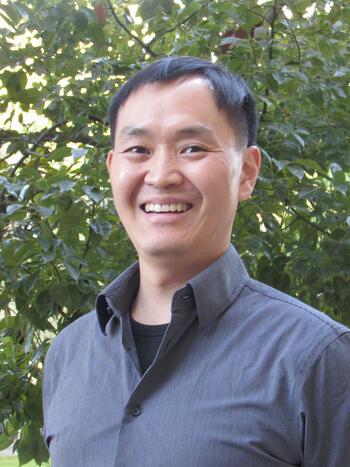Four scholars from Stanford University participated in a public panel discussion on Silicon Valley and Asian economies last month, part of a filming for an NHK Broadcasting series that aims to bring opinion leaders together to discuss issues facing contemporary Japan. The panel event will debut online this Friday.
“Silicon Valley is known worldwide as a place for many new innovative ideas, individuals and companies,” said Takeo Hoshi, director of the Japan Program at the Shorenstein Asia-Pacific Research Center (APARC). “Such economic dynamism is what many countries and regions across the world want to imitate. This is especially true for Asian economies.”
During the hour-long event, Hoshi moderates a discussion between William Barnett, a professor of business leadership, strategy and organizations at the Graduate Business School; Francis Fukuyama, the director of the Center on Democracy, Development and the Rule of Law; and Kenji Kushida, a research associate of Shorenstein APARC’s Japan Program.
The panel set out to consider how Silicon Valley realized success and its implications for Asian countries that seek to develop similar innovation-based economies. Panelists started by offering a single keyword that represents Silicon Valley in their own definition. They are: harness, social capital, and failure.
“The question that everyone is interested in is how to make use of Silicon Valley,” Kushida said. “How to ‘harness’ the innovation ecosystem that works fairly well here.”
A key component of Silicon Valley’s success is the high level of social capital found in the region, the panelists said.
“The level of informal cooperation…is higher than in other parts of the country,” Fukuyama explained. Silicon Valley has a norm of reciprocity and lacks extensive business contracts that impede fluidity of ideas, he said.
The panelists also explored the impact of government policy. They said that it provides an essential service in supplying a framework – at least initially – from which innovation-based economic activities can emerge.
“The government needs to set up a playing field upon which firms and entrepreneurs…can do the unimaginable,” Barnett said.
The U.S. government played an important role in a number of defense-related projects that led to the formation of new technologies, including the Internet. However, a government role “cannot smother and be too directive,” Fukuyama said.
Kushida notes that he leads a research project that looks at the institutional foundations of Silicon Valley and offers lessons applicable to Japan. Last year, Kushida and Hoshi authored a report with three other scholars that identifies six institutional factors that encourage innovation, and what the Japanese government can do to encourage development of a more effective innovation ecosystem.
Culture can play a powerful role, too, the panelists explained. They described how both organizational and national cultures can foster or impinge upon innovation.
Barnett said it may be “cool” to be an entrepreneur in Silicon Valley, but in Japanese culture, for example, it is the opposite. Barnett has studied entrepreneurs in Japan and has written many publications about how organizations and industries evolve globally.
Approaches to overcoming hard-fastened barriers to innovation include developing a culture of trust and acceptance toward failure, the panelists explained. Yet, they also cautioned against attempts to copy Silicon Valley too closely.
“I don’t think we should take this Silicon Valley gospel for granted – that disruption is always great and that things will always be necessarily better in social terms,” Fukuyama said.
The panelists recognize the outgrowth of high-tech areas in other areas around the world, and note that it is impossible to predict what innovations will come next and their impact on humanity.
The panel event was broadcast and live-tweeted with #SVAsia on Friday, March 4, from 4:10-5:00 p.m. (PST). The video can be viewed on demand here.


 Gaurav Kataria is a Big Data leader at Google who is responsible for driving Production Adoption initiatives across various Google for Work product lines - Gmail, Drive, G+, Hangouts, Google Docs, Drive, Android and Chrome. His group employs sophisticated machine learning and data mining techniques to understand the usage patterns across different products, and based on that creates programs to improve user engagement.
Gaurav Kataria is a Big Data leader at Google who is responsible for driving Production Adoption initiatives across various Google for Work product lines - Gmail, Drive, G+, Hangouts, Google Docs, Drive, Android and Chrome. His group employs sophisticated machine learning and data mining techniques to understand the usage patterns across different products, and based on that creates programs to improve user engagement.